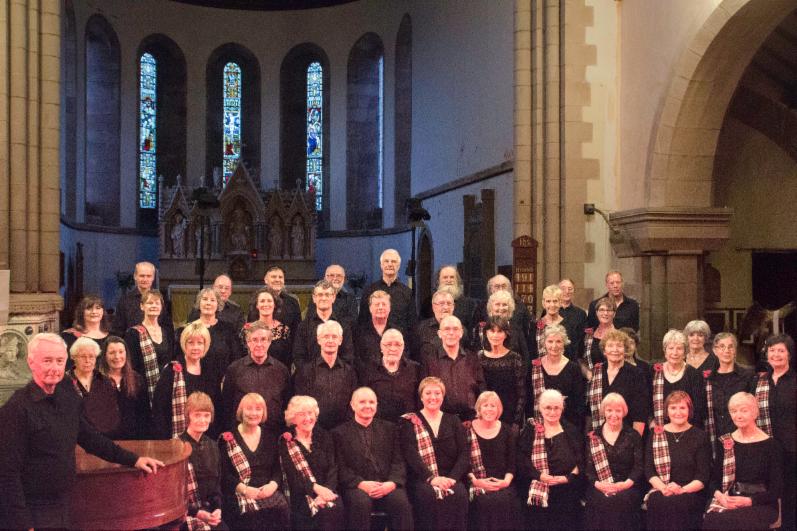St JAMES’ CHURCH, STONEHAVEN
“From Scotland to Hungary, a musical journey”, was the title of this year’s Spring Concert from The Stonehaven Chorus conducted by Ralph Jamieson. Later this year, in mid-October, the choir will visit Budapest in Hungary where they will give concerts, hence today’s programme which was a preparation for their exciting mid-European adventure.
The choir opened their performance with five Scottish items. The first, a rousing arrangement of MacGregor’s Gathering by the Choir’s conductor Ralph Jamieson set the Scottish background securely. To follow in a more gentle vein was ‘So Deep’, a setting of ‘My Love is like a red, red rose’ by one of Scotland’s premier composers James MacMillan. The sopranos had the tune, not the one we generally hear today, but rather the one Robert Burns himself would have known while the rest of the chorus provided an ethereal backing – very imaginatively done.
Rantin’ Rovin’ Robin, another Burns standard set by Ralph Jamieson followed on in somewhat similar style with today’s guest soloist, soprano Moira Docherty, carrying the tune while the chorus provided the hummed backing. The next two pieces were arrangements of Gaelic songs by Don French, one of the stalwart basses in the choir. Màili Dhonn was set for male voices only with the basses having a fine sturdy role. The second setting, Rubh nan Cudaigean for the female voices was what is known as a waulking song where the sound of the women beating out the rhythm as they worked on the tweed was provided by the stamping of feet. This worked spectacularly well.
Perhaps the choir will have to visit England on their way to Hungary? Hosannah to the Son of David an anthem by the English composer Thomas Weelkes was rousingly sung by the full choir.
From England on to Austria and two favourite church motets by Anton Bruckner, Locus Iste and Christus factus est in which the choral crescendi were particularly well done.
At last we were in Hungary with A Bujdosó by Béla Bartók and Ének Szent Istvan Királyhoz by Zoltán Kodály sung by the chorus, yes, in Hungarian. I am certain those will go down splendidly on their visit in October.
The second part of the concert was even better than the first. The choir sang with splendid transparent clarity in their performance of Paul Mealor’s Stabat Mater. Mealor is professor of composition at Aberdeen University which makes him an honorary Scot although he comes originally from Wales. I believe however that his family originates from Hungary. The words came across clearly and Mealor’s delicious harmonies shone throughout the piece. As the programme note suggested, there is a suggestion of the music of Carl Orff in the central section of the work, particularly in the use of rhythm and here the male voices in unison sounded magnificent. Equally brilliant was the singing of guest soprano Moira Docherty. Her voice soared over the choral accompaniment and here too, pianist Arthur Balfour came into his own with a starring role.
The rest of the programme was largely sung unaccompanied which is something of an achievement for any choir.
To complete the programme was another unaccompanied piece from Hungary, Zoltán Kodály’s Esti Dal a gentle goodnight song with the sopranos holding the tune supported by a gentle hummed backing from the choir. This was a choral texture that was something of a special feature in this concert.
